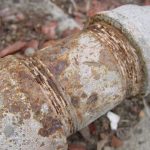Are you tired of dealing with costly repairs and backups caused by clogged drains and sewer lines? It’s time to take matters into your own hands and prevent these issues before they escalate.
In this blog post, we’ll discuss five simple steps you can take to keep your drains flowing smoothly and avoid the headache of expensive repairs. Don’t let a clogged drain ruin your day – follow our steps and keep your plumbing in tip-top shape!
Understanding How Clogs Happen
Clogged drains and sewer lines are a common household problem that can cause inconvenience, frustration, and expensive repairs. In this section, we will delve into the various factors that contribute to clogs in your plumbing system and how they happen.
Build-up of debris
The most common reason for clogs is the build-up of debris such as hair, soap residue, food particles, grease, and other waste materials that get stuck in the pipes over time. This accumulation can lead to blockages and slow draining water.
Tree roots
Tree roots are another major contributor to clogged sewer lines. As trees grow, their roots tend to extend towards sources of moisture which includes sewer lines. The roots can wrap around or penetrate through the pipes causing damage and obstruction of the flow of water.
Flushing inappropriate items
Flushing inappropriate objects down your toilet or sink is a frequent cause of clogs. Items such as wet wipes, sanitary products, dental floss, cotton swabs, and paper towels do not break down easily like toilet paper does and can get stuck in the pipes leading to blockages.
Poor pipe installation
Incorrectly installed plumbing systems can also contribute to clogs in your drains and sewer lines. If there are any low spots or dips in the pipes where solids can settle instead of being carried away by the water flow, it can result in obstructions.
Aging pipelines
As pipes get older, they become more susceptible to cracks or breaks due to wear and tear from regular use or shifting soil conditions outside your home’s foundation. These damages create openings for debris to accumulate inside the pipes leading to blockages.
Grease buildup
Pouring cooking oil or grease down your kitchen sink may seem convenient at first but it is one of the biggest culprits behind clogged drains. When hot grease cools down inside your pipes it solidifies creating sticky residue, trapping other debris and causing a major clog.
Understanding how clogs happen is crucial in preventing them from occurring in the first place. Regular maintenance and proper usage of your plumbing system can go a long way in avoiding costly repairs and inconveniences caused by clogged drains and sewer lines. In the next section, we will discuss some simple steps you can take to prevent these issues from happening.
5 Steps to Prevent Clogged Drains and Sewer Lines
Whether you’re a homeowner seeking to maintain your property or someone currently facing recurring clogs, here are five key steps to prevent these plumbing nightmares.
Step 1: Prevent Throwing Sticky Food Down the Kitchen Sink
The most common culprit of clogged kitchen drains is food waste, particularly sticky or greasy items. When you let oils, fats, and other debris go down the drain, it can accumulate and form blockages over time. To prevent this from happening, make sure to scrape all food scraps off dishes before washing them in the sink and avoid pouring cooking oil or grease directly down the drain. Instead, wipe off excess oil with a paper towel and dispose of it in the trash.
Step 2: Prevent Your Hair From Falling out Into the Sink or Shower
Another common cause of clogged drains is hair buildup. Whether it’s in the bathroom sink or shower, strands of hair can quickly accumulate and create blockages over time. To prevent this, use a drain cover or strainer to catch any loose hairs and regularly clean them out after each use. This simple step can go a long way in preventing clogged drains and sewer lines.
Step 3: Stop Soap Scum in Its Tracks
Soap scum is a combination of soap residue, hard water minerals, and dirt that can build up in your drains and lead to clogs. To prevent this from happening, use a mesh drain catcher or strainer in your shower or bathtub to catch any excess soap scum before it goes down the drain. You can also regularly pour boiling water down your drains to help dissolve any build-up. Additionally, using a natural drain cleaner like a mixture of baking soda and vinegar can help break down soap scum and keep your drains clear.
Step 4: Throw Away Trash Properly
Last but not least, make sure to properly dispose of waste and trash in your home. Items like feminine hygiene products, paper towels, wet wipes, and cotton balls should never be flushed down the toilet or thrown into sinks or drains. These items do not break down easily and can quickly accumulate and cause clogs in your sewer lines.
Step 5: Schedule Regular Professional Drain Cleaning Services
Regular maintenance is key to preventing clogged drains and sewer lines. While there are various DIY methods that can help in keeping your pipes clean, they may not always be enough. Professional drain cleaning services should be scheduled on a regular basis to ensure the proper functioning of your plumbing system.
Why Hire a Professional?
There are several benefits to hiring a professional drain cleaning service. Firstly, professionals have the necessary expertise and experience to identify any potential issues in your drainage system. They will thoroughly inspect your pipes using specialized tools and equipment, such as drain cameras, to pinpoint any clogs or blockages.
Moreover, professional plumbers use effective techniques and high-quality products that are not available to the general public. These techniques include hydro jetting, which involves using pressurized water to clear out tough clogs and buildup in the pipes. This method is highly efficient and leaves your drains completely clean without causing any damage.
Scheduling regular professional drain cleaning services also helps in identifying any underlying problems with your plumbing system before they turn into major issues. Plumbers can detect early signs of corrosion, leaks, or tree root intrusions that could potentially lead to costly repairs if left untreated.
How Often Should You Schedule Drain Cleaning Services?
The frequency of scheduling professional drain cleaning services depends on various factors such as the age of your home’s plumbing system, the number of occupants in your household, and the types of activities that take place at home (such as frequent cooking or hair washing). As a general rule of thumb, it is recommended to schedule annual drain cleaning services for preventative maintenance.
However, if you notice recurring clogs or slow draining sinks/showers/toilets despite following all preventive measures, it may be necessary to schedule more frequent visits from a professional plumber.
Other Tips for Maintaining Clean Drains
In addition to scheduling regular professional drain cleaning services, there are some other things you can do to keep your drains clean and free from clogs. These include:
– Using drain covers or strainers to catch hair, food particles, and other debris before they enter the pipes
– Avoiding pouring grease or oil down the drain
– Flushing only water-soluble waste down the toilet
– Regularly cleaning out the sink stoppers and shower grates to remove any buildup
Regular professional drain cleaning services are an essential part of maintaining a healthy plumbing system. By hiring a professional plumber on a regular basis, you can prevent clogged drains and sewer lines, detect potential issues early on, and ensure the longevity of your home’s plumbing system. Don’t wait for a major blockage to occur before scheduling a service – prevention is always better than cure.
Benefits of Maintaining Healthy Drains and Sewer
Maintaining healthy drains and sewer lines may seem like a tedious task, but the benefits far outweigh the effort put into it. In this section, we will discuss some of the key advantages of keeping your drains and sewer lines in top condition.
Prevents Clogs and Blockages
One of the most significant benefits of maintaining healthy drains and sewer lines is preventing clogs and blockages from occurring. Regularly cleaning your drains and sewer lines can remove any buildup of debris, hair, or other materials that can lead to clogs. This not only helps to keep your plumbing system functioning properly but also saves you from expensive repairs in the future.
Reduces Unpleasant Odors
Clogged drains and sewer lines are notorious for producing unpleasant odors that can linger throughout your home or business. These odors are not only unpleasant but also indicate a potential health hazard. By regularly cleaning out your drains and sewer lines, you can eliminate these foul smells, creating a more pleasant living or working environment.
Protects Your Home’s Foundation
Blocked sewer lines can cause wastewater to back up into your home’s pipes, leading to flooding and potentially damaging your home’s foundation over time. This damage can be costly to repair, making it essential to maintain healthy drains and sewer lines to prevent such issues from occurring.
Saves Money on Repairs
Regular maintenance of your drains and sewers is a cost-effective way to avoid expensive repairs in the long run. Ignoring issues with your drainage system can lead to major problems that require professional intervention at a higher cost than routine maintenance would have been initially.
Improves Overall Hygiene
Clean drains promote better overall hygiene by preventing bacteria build-up that could potentially spread harmful diseases within the household or workplace environment.
Preserves Water Quality
Clogged sewers can cause wastewater to back up into your water supply, contaminating it and making it unsafe for consumption. By keeping your drains and sewer lines clean and clear, you ensure that the quality of water in your home or business remains safe.
Follow These Steps and Keep Your Drains Clean
In conclusion, taking proactive measures to prevent clogged drains and sewer lines can save you from costly repairs, inconvenience, and unpleasant odors in your home. By following these five simple steps and being mindful of what goes down your drains, you can maintain a healthy plumbing system and avoid potential problems in the future.
Remember to schedule routine maintenance with a professional plumber and properly dispose of waste to keep your drains and sewer lines clear. So, always remember to follow these tips and keep your plumbing system in top shape!





